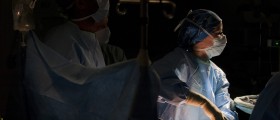
Light-headedness after Eating
Light-headednessis characterised by a sensation of dizziness and may last a few minutes or longer. The head can also feel weightless and the person may feel like they are fainting. There are several probable causes for light-headedness, the most common of which are low blood pressure, vertigo and stress. Light-headedness happens when the blood pressure in the head drops.
When a person eats, their stomach becomes much more active than at other times. Active body parts require a lot more blood than non-active body parts, so blood is redirected to the stomach when digestion is required. The more food that needs to be digested, the more blood needs to go to the stomach because it needs to work harder. If a large quantity of food is ingested, so much blood can be redirected to the stomach that the brain receives less blood than it needs. This causes the feeling of light-headedness.
PreventingLight-headedness after Eating
Payingattention to one's dietary choices is important for a healthy lifestyle. This also applies in the case of light-headedness after eating. Processed foods and foods with a high sugar content tend to cause the stomach to work harder than other types of food. This typically affects a person about an hour after the meal. When a substantial amount of sugar is ingested during one meal, the sugar levels in the blood spike up and this sudden change can cause light-headedness due to changes in blood pressure.
Eatinguncooked food, eating food to which one has allergies and eating foods rich in carbohydrates will make the stomach work harder, as it is forced to digest difficult foods. This can also cause nausea simply due to the contents of the food. To help prevent light-headedness, eat vegetables and foods rich in protein andcarbohydrates.
Eatingtoo quickly, or moving too soon after eating a meal can cause light-headedness because blood is required in many parts of the body at once and there might not be enough of a supply to the brain. Chew food thoroughly to ease digestion and take a moment to relax after eating a meal.
Somediseases and other medical conditions, such as thyroid problems or renal disorders, can increase the risk of light-headedness after eating due to the effects they have on the body. Pregnancy and digestive diseases like gastritis are also common causes of light-headedness.
Certainmedication, including those for heart problems or stress problems, antidepressants and diuretics can also increase the risk of light-headedness after eating. These medicines typically cause a chance in the blood pressure, which has similar effects as those described above. Stress is another major cause of this condition, as it increases the heart rate and can cause sudden drops in blood pressure, leading to a feeling of light-headedness.

















Your thoughts on this
Loading...